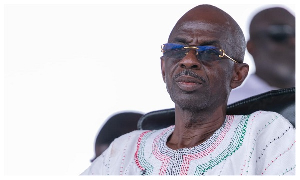The Bui Power Authority will tomorrow, February 3, 2021, inaugurate six new business modules under its Livelihood Enhancement Programme (LEP) the Authority has announced.
The Authority had in 2019 developed business modules in a structured restoration program to improve the lives of the Project Affected Persons (PAPs) of the Bui Hydroelectric Project.
Seventeen Business Modules were initially developed with operational requirements and approaches. The implementation approach had been to constitute the 816 eligible PAPs into groups under each Business Module and resource them with the required work tools/equipment, PPEs and facilities which fully sets them up to undertake their respective businesses. The groups included Aquaponics Fishing, Sanitation, Fumigation, Weeding/Landscaping/Fire Control, Lawn Maintenance, Cleaning Services, Warehouse Maintenance and Event/Entertainment Management.
The new modules include Tractor and Garage Services, Artisanal Shops, Raised Fishponds, Fish Mongering and other Skills training. In total, 237 will benefit from the new business modules; bringing the total number of PAPs benefitting from the BPA Business Modules thus far to 409 out of the 815 PAPs.
Two main Business Modules: i) Service Providers and ii) Standalone businesses. Service Providers offer services which the Authority and other entities require. The Authority automatically subscribes to and extends service contracts to such Groups; whilst other businesses whose services are not required by Authority in the immediate term (categorized as Standalones), receives patronage from the Authority as and when the need arises.
It is estimated that BPA will spend GHS4 million in this regard. Thus far, an estimate of about GHS2 million has been disbursed.
The implementation of the Business Modules the Authority says shows clearest demonstration of its commitment to improve the socio-economic wellbeing of the PAPs.
Background
The development of Bui Hydroelectric Project caused to be resettled seven (7) communities with a total population of 1,216 persons, referred to as Project Affected Persons (PAPs). The affected communities included: Brewohodi, Lucene, Dam Site, Agbekikuro, Bui, Bator Akanyakrom and Dokokyina. The BPA resettlement program was executed under three (3) main themes: Replacement of lost properties; Restoration of lost economics; Maintenance of socio-cultural and traditional arrangements. Between 2008 – 2011, all the activities planned under the 3-themes were executed.
Replacement of lost properties
Under the ‘Replacement of Lost Properties’, two well-planned Townships, each located within the Bono and Savanna Regions were developed. The Resettlement Townships have social amenities such as road network, potable water, electricity, biofil toilet facilities, community center and school with playgrounds.
Restoration of lost economics
Per the baseline survey carried out before the relocation, farming and fishing were identified as the main source of livelihood of the PAPs. Accordingly, to restore their economic livelihoods, farmers were allotted a 2-arce farmland each with financial support to prepare the land for cultivation. Each household was given a Temporary Monthly Income Support for 12 months to augment income during the cultivation period. Also, Extension Officers from Development Solutions Center were engaged to assist farmers on best farming practices and improved crop varieties. The farmers were also constituted into cooperatives to enable them secure external funding. Fisherfolks were also catered for with the development of two Landing Sites to facilitate fishing activities on the formed Bui Reservoir.
Maintenance of socio-cultural and traditional arrangements
The development of the Resettlement Townships and allotment of housing units were done to distinctly define each of the Communities to ensure maintenance of their socio-cultural and traditional arrangements.
Business News of Tuesday, 2 February 2021
Source: classfmonline.com
Bui Power Authority inaugurates six new business modules February 3
Entertainment












